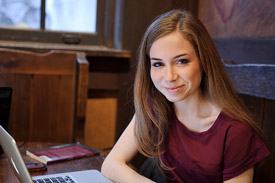UW undergraduate Alexis Brown named Rhodes Scholar
University of Wisconsin–Madison senior Alexis Brown is one of an elite group of American students to be awarded a 2012 Rhodes Scholarship, one of the most coveted honors in the world of higher education.

UW–Madison senior Alexis Brown, one of an elite group of 32 American students to be awarded a 2012 Rhodes Scholarship, is pictured at the Memorial Union. Brown is an English and history major from Algonquin, Ill. She applied for a Rhodes Scholarship to complete a master of studies in English language and literature.
Photo: Jeff Miller
Brown, an English and history major from Algonquin, Ill., applied for a Rhodes Scholarship to complete a master’s degree in English language and literature. Her work, in the classroom and the community, demonstrates how narrative “helps us to think about the social, the ethical, and the existential,” according to her application materials.
The honor was announced late Saturday by American Rhodes Secretary Elliot Gerson.
“We congratulate Alexis on winning the most prestigious of all higher education honors,” says Interim Chancellor David Ward. “In her, we see the makings of a gifted scholar who will be an effective voice for the humanities within academia and beyond.”
She is the first UW–Madison student to win the scholarship since 2000.
Brown will be invited to spend two to three years of study at Oxford University in England. The scholarship, valued at approximately $50,000 per year on average, was founded there in 1902 by British philanthropist Cecil Rhodes, and is the oldest international study program in the world.
Hundreds of elite applicants competed, representing dozens of colleges and universities. After Brown completed regional interviews in Chicago, she and other finalists waited for two hours while the selection committee deliberated.
“I was absolutely stunned; it was just such a long shot,” says Brown. “Honestly, just getting up the courage to apply was difficult. It’s hard to convince yourself you could actually win a Rhodes.”
Candidates are judged on a proven record of intellectual and academic achievement, integrity of character, interest in and respect for others, leadership ability, and the energy to fully utilize their talents.
Brown hopes to study English literature with professor Laura Marcus, the preeminent scholar on Dorothy Richardson and cinematic modernism.
“I want to make the humanities accessible for people,” says Brown. “I think people sometimes have a tendency to disparage the humanities as irrelevant, or not useful. But the arts are what connect us to the most important, the most poignant aspects of our experience. They’re what make us human.”
UW–Madison English professor Richard Begam ranks Brown as the “most promising and talented undergraduate” he’s taught. History professor Jennifer Ratner-Rosenhagen notes her intellectual range, and ability to move “with ease between a number of interpretive registers: sociological, philosophical, historical, and literary.”
Brown has shared her love for teaching on and off campus. She works as a writing fellow (peer tutor), providing feedback on students’ draft papers in writing-intensive courses. In the summer of 2011, she served as a teaching assistant with the AmeriCorps Schools of Hope program, helping children from low-income families build their reading and math skills. Since 2009, she’s volunteered at the Bayview International Community Center, where she pioneered a successful creative writing workshop for kids.
Brown’s creativity and leadership has found a home in two undergraduate journals. She’s served as a poetry reviewer, copy editor and associate editor for The Madison Review, an independent literary arts journal. She is also the founder and editor-in-chief of The Madison Journal of Literary Criticism, the first national undergraduate journal of its kind.
Despite her strong academic background, Brown still found it difficult to review her own work while preparing her application.
“As I wrote my personal statement, I had to reflect on how all the disparate parts of my experience fit together and figure out what was really important to me — why I wanted to do what I wanted to do,” she says. “But I rediscovered parts of myself that reconnected me to the things I loved, especially literature and teaching.”
UW–Madison had two finalists among 11 interviewing for the scholarship in a district that included Wisconsin, Iowa and Minnesota. There are 16 districts nationally, each of which can name two scholars for a total of 32 per year.
The other UW–Madison finalist was Evan Mast, a senior from Menominee Falls, Wis., majoring in economics and mathematics. The focus of his study is the economic framework of analyzing issues related to urban poverty and the efficacy of anti-poverty policies.
The last UW–Madison student to win was Robert Yablon in 2000, with other recent awardees including former Wisconsin Secretary of Commerce Aaron Olver, a 1996 graduate in economics. In 1994, rural Green Bay native James Wall received the honor.
Well-known past Rhodes honorees include President Bill Clinton and UW–Madison graduate and former U.S. Sen. Russ Feingold.
Susannah Brooks contributed to this article.
Tags: learning, student awards, student life




